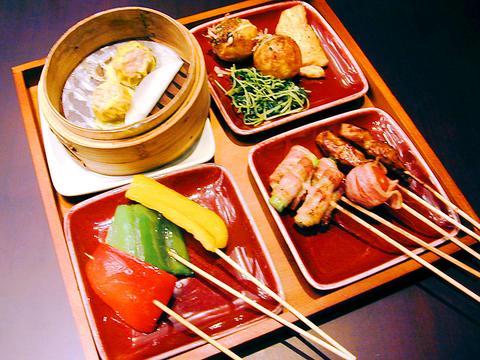Wasabi is actually two different restaurants located next door to one another in the Taipei 101 Mall, a dining bar and a buffet. This review regards the buffet. While the two share the same kitchen and staff and even several dishes, they are distinct dining experiences. The dining bar is a straightforward restaurant, but the buffet is billed as a "Japanese food festival." It's an appropriate billing.
The Formosa Regent Hotel, which owns and operates Wasabi, has essentially brought a Japanese night market indoors and made it upscale. That is, as upscale as a buffet can be made. There is a kind of wide-eyed ravenousness among all buffet-goers, and even the highbrow mall patrons who perambulate into Wasabi quickly start salivating and circling the buffet areas. The fact that they're in a sleek interior of dark woods and vertical louver walls and carrying elegant flatware makes them look no less like a pack of dogs. It's not surprising, given all that's on offer.
The first buffet area is a fisherman's haul of shrimp, sushi, sashimi and fish-egg rolls prepared fresh on the other side of the counter and laid in individual wicker baskets.

PHOTO: DAVID MOMPHARD, TAIPEI TIMES
But plan accordingly; there are four other buffets. One includes large fried octopus balls and all manner of grilled things. Of note are the bacon-wrapped cherry tomatoes and asparagus, but be sure to ask for items fresh from the grill. Another area offers a variety of noodles too numerous to name and another offers dim sum, several bite-sized desserts and fruit, including mangosteens with the tops cut off. I forgot a spoon but was quickly brought one by a staffer who noticed me trying to suck my mangosteen's insides out.
Since you're already feeding from the trough, go ahead and be a pig. Dish up a bowl of Movenpick ice cream and choose your topping. Don't forget a coffee or cappuccino available at the push of a button.
There are, by most accounts, too many items here to sample in one sitting. But the bottom line is whether a buffet -- even one this good -- is worth NT$800. If you're hungry and in the mood to spend a couple hours sampling everything from soba noodles to candy-coated shrimp -- or if you're a fan of sushi and sashimi -- it's worth it (at least it feels so afterward). If you're not in the "food festival" mood, save yourself a bit of cash and step next door.

Oct. 27 to Nov. 2 Over a breakfast of soymilk and fried dough costing less than NT$400, seven officials and engineers agreed on a NT$400 million plan — unaware that it would mark the beginning of Taiwan’s semiconductor empire. It was a cold February morning in 1974. Gathered at the unassuming shop were Economics minister Sun Yun-hsuan (孫運璿), director-general of Transportation and Communications Kao Yu-shu (高玉樹), Industrial Technology Research Institute (ITRI) president Wang Chao-chen (王兆振), Telecommunications Laboratories director Kang Pao-huang (康寶煌), Executive Yuan secretary-general Fei Hua (費驊), director-general of Telecommunications Fang Hsien-chi (方賢齊) and Radio Corporation of America (RCA) Laboratories director Pan
The consensus on the Chinese Nationalist Party (KMT) chair race is that Cheng Li-wun (鄭麗文) ran a populist, ideological back-to-basics campaign and soundly defeated former Taipei mayor Hau Lung-bin (郝龍斌), the candidate backed by the big institutional players. Cheng tapped into a wave of popular enthusiasm within the KMT, while the institutional players’ get-out-the-vote abilities fell flat, suggesting their power has weakened significantly. Yet, a closer look at the race paints a more complicated picture, raising questions about some analysts’ conclusions, including my own. TURNOUT Here is a surprising statistic: Turnout was 130,678, or 39.46 percent of the 331,145 eligible party

President William Lai (賴清德) has championed Taiwan as an “AI Island” — an artificial intelligence (AI) hub powering the global tech economy. But without major shifts in talent, funding and strategic direction, this vision risks becoming a static fortress: indispensable, yet immobile and vulnerable. It’s time to reframe Taiwan’s ambition. Time to move from a resource-rich AI island to an AI Armada. Why change metaphors? Because choosing the right metaphor shapes both understanding and strategy. The “AI Island” frames our national ambition as a static fortress that, while valuable, is still vulnerable and reactive. Shifting our metaphor to an “AI Armada”

The classic warmth of a good old-fashioned izakaya beckons you in, all cozy nooks and dark wood finishes, as tables order a third round and waiters sling tapas-sized bites and assorted — sometimes unidentifiable — skewered meats. But there’s a romantic hush about this Ximending (西門町) hotspot, with cocktails savored, plating elegant and never rushed and daters and diners lit by candlelight and chandelier. Each chair is mismatched and the assorted tables appear to be the fanciest picks from a nearby flea market. A naked sewing mannequin stands in a dimly lit corner, adorned with antique mirrors and draped foliage